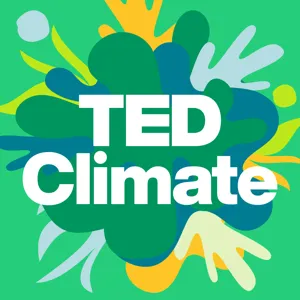Podcast Summary
Exploring Sustainable Cooling Solutions: Consider eco-friendly cooling methods like reflective paints, green roofs, and support innovative tech. Adopt sustainable practices to mitigate climate change impacts.
As the world grapples with rising temperatures, it's essential to explore sustainable cooling solutions beyond traditional air conditioning. Rachel Kite, a sustainable development diplomat, encourages us to consider affordable, non-polluting methods like reflective paints and green roofs. Meanwhile, technology continues to advance with tools like Canva's AI-generated presentations and Slack's automation workflows, helping businesses grow more efficiently. To deepen your understanding of the climate crisis, check out the podcast "Climate 1," featuring insightful conversations with experts on various climate-related topics. Overall, it's crucial to adopt eco-friendly practices in our daily lives and support innovative solutions to mitigate the impacts of climate change.
Rising Demand for Cooling and the Challenge of Sustainability and Equity: By 2050, the number of air conditioners is projected to increase fivefold, necessitating sustainable and equitable cooling solutions to meet demand while reducing energy consumption and greenhouse gas emissions.
The world is experiencing extreme heat waves more frequently, and as a result, the demand for cooling is increasing dramatically. However, traditional cooling methods, such as air conditioning, are energy inefficient and contribute to greenhouse gas emissions. This creates a challenge for ensuring both sustainability and fairness, as those with means can afford to stay cool, while many people living in urban or rural areas lack access to reliable energy and cooling solutions. By 2050, the number of air conditioners in use is expected to increase fivefold, leading to a significant jump in electricity demand. It's essential to find sustainable and equitable cooling solutions to address this issue and ensure that everyone, regardless of income or location, can stay cool and live comfortably.
Designing for cooling: Building, materials, and appliances: Exploring innovative building designs, materials, and appliances can help us provide sustainable cooling solutions for the 2.3 billion people without contributing to global warming.
Addressing the cooling needs of the 2.3 billion people who cannot afford inefficient or polluting air conditioners presents an opportunity to provide sustainable cooling solutions without contributing to global warming. This can be achieved through various means, including city design, architecture, building materials, and appliances. First, we need to build and design differently for cooling, moving away from hermetically sealed buildings and towards district cooling, green roofs, and energy-efficient windows. Second, we need to make cooling hyper efficient through the use of advanced technologies and materials. For instance, we can develop brighter, whiter paints that reflect up to 98% of sunlight, and modular roofing panels made from paper and waste wood. Additionally, we can use solar-controlled glass for windows that provide high daylight transmission, thermal insulation, transparency, and low reflection. Overall, there are numerous promising solutions in the areas of building design, materials, and appliances, and prioritizing and investing in these areas can help us transform the way we cool our buildings and cities while minimizing our carbon footprint.
Prioritizing Energy Efficiency in Heating and Cooling Systems: We need to make every air conditioner for sale efficient, transition to HFC-free AC, implement cold chains, and use renewable energy for cooling to reduce emissions and improve energy efficiency.
We need to prioritize energy efficiency in all aspects of our economy, particularly in heating and cooling systems. The developed world has made significant strides in energy efficiency with high-end air conditioners being 25-50% more efficient than those from a decade ago. However, we need to make every air conditioner for sale everywhere at least 50% more efficient than the most efficient one on the market today. This includes making heating and cooling more synergistic, transitioning to hydrofluorocarbon (HFC)-free air conditioning, and implementing cold chains for food, medicines, and vaccines. The Kigali Amendment, which aims to phase down HFC production and consumption, could significantly grow the market for emissions-free, non-polluting cooling technologies. Additionally, the use of solar, non-toxic vaccine refrigerators, coal boxes, and mobile cold storage units that run on off-grid energy are essential for distributing vaccines and other temperature-sensitive goods to vulnerable populations.
Improving cold chain with technology: Technology like Bluetooth and drones enhance cold chain, ensuring food and vaccine safety in energy-scarce areas. Investing in efficient cooling solutions is vital for communities and the planet, especially as climate change threatens.
Technology, particularly Bluetooth and drones, can significantly improve the cold chain and ensure food and vaccine safety, even in energy-scarce areas. Moreover, investing in affordable, non-polluting, and efficient cooling solutions is crucial for communities and the planet, as climate change poses a significant threat. Animals are already adapting to the heat, but humans need to adapt by transforming our cities and towns and finding innovative ways to cool ourselves and preserve essential items. It's essential to have more conversations and investments in these solutions to create safer, healthier, and more sustainable communities.






